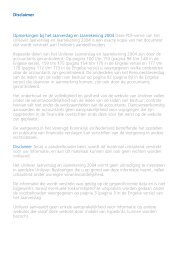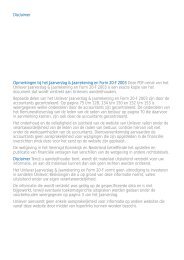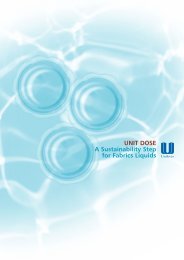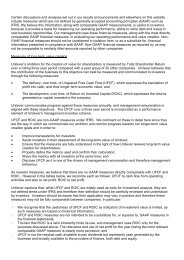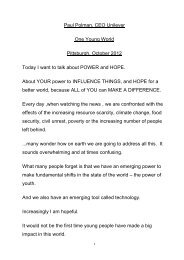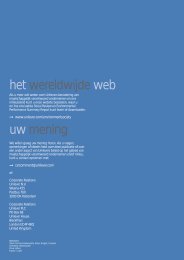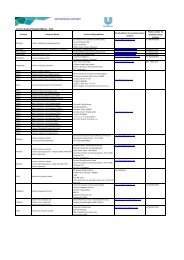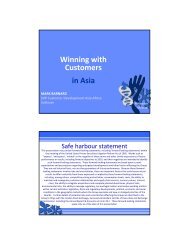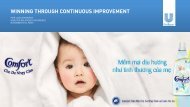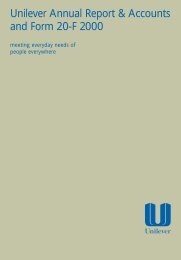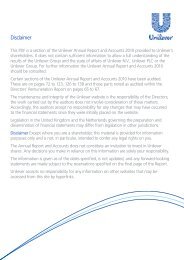Unilever Sustainable Living Plan Progress Report 2011
Unilever Sustainable Living Plan Progress Report 2011
Unilever Sustainable Living Plan Progress Report 2011
Create successful ePaper yourself
Turn your PDF publications into a flip-book with our unique Google optimized e-Paper software.
28 <strong>Unilever</strong> <strong>Sustainable</strong> <strong>Living</strong> <strong>Plan</strong> <strong>Progress</strong> <strong>Report</strong> <strong>2011</strong><br />
REDUcInG WASTE VIA REcYcLInG<br />
recycle Packaging<br />
OUR TARGETS<br />
5.3 Working in partnership with<br />
industry, governments and ngos,<br />
we aim to increase recycling and<br />
recovery rates on average by 5%<br />
by 2015 and by 15% by 2020 in our<br />
top 14 countries. For some this<br />
means doubling or even tripling<br />
existing recycling rates.<br />
We will make it easier for<br />
consumers to recycle our<br />
packaging by using materials<br />
that best fit the end-of-life<br />
treatment facilities available<br />
in their countries.<br />
5.4 By 2020 we will increase the<br />
recycled material content in our<br />
packaging to maximum possible<br />
levels. this will act as a catalyst to<br />
increase recycling rates.<br />
l<br />
l<br />
OUR PERFORMANCE<br />
3.4% increase in recycling and<br />
recovery rates, averaged across<br />
our top 14 countries. some of<br />
this increase resulted from<br />
improved data.<br />
1,700 tonnes of post-consumer<br />
recycled materials incorporated<br />
into our rigid plastic packaging<br />
in <strong>2011</strong>.<br />
We have initiated a number of projects<br />
from which we are hoping to select<br />
the most successful to be rolled<br />
out elsewhere. Many of our projects<br />
incentivise consumers to start recycling.<br />
others explore systemic solutions through<br />
improving local waste infrastructure,<br />
working with local government and waste<br />
services providers.<br />
recycling aerosols<br />
As leaders of the global<br />
deodorant market we want<br />
more people to recycle<br />
aerosol cans. In July 2010 we<br />
started a pilot in partnership<br />
with the leading Brazilian<br />
supermarket, Pão de Açúcar.<br />
It was successful and<br />
has led to the permanent<br />
introduction of aerosol<br />
collection at Pão de Açúcar<br />
sites. To date we have<br />
collected more than 1,600<br />
tonnes of aerosols through<br />
110 collection stations.<br />
recycling in the BathrooM<br />
Although many consumers recycle<br />
kitchen waste, the bathroom tends to<br />
be forgotten. In <strong>2011</strong> we partnered with<br />
RecycleBank in the United States to<br />
encourage consumers to recycle Dove<br />
and Suave shampoo bottles in return for<br />
money off coupons. An online module<br />
educated people about what they can<br />
recycle, what recycling<br />
symbols to look for and<br />
then rewarded them<br />
with points which could<br />
be redeemed for goods<br />
and services. The Dove<br />
module was viewed<br />
6 million times.<br />
redUce Waste FroM<br />
oUr ManUFactUring<br />
OUR TARGETS<br />
5.5 By 2020 total waste sent for<br />
disposal will be at or below<br />
2008 levels despite significantly<br />
higher volumes.<br />
this represents an 80% reduction<br />
per tonne of production and a<br />
70% absolute reduction (versus<br />
a 1995 baseline).<br />
5.6 all newly built factories will aim to<br />
generate less than half the waste<br />
of those in our 2008 baseline.<br />
l<br />
l<br />
OUR PERFORMANCE<br />
over 62,000 fewer tonnes of<br />
total waste † in <strong>2011</strong> than in<br />
2008 – a combination of waste<br />
reduction and waste recycling.<br />
this represents a reduction of<br />
40% in total waste per tonne<br />
of production. †<br />
compared to 1995, this<br />
represents an 82% reduction<br />
in absolute terms. †<br />
during 2010–11 we incorporated<br />
sustainability improvements<br />
into every aspect of the design<br />
specification for our new factories.<br />
these improvements will be<br />
incorporated in all new designs<br />
from 2012 onwards.<br />
By the end of <strong>2011</strong>, 74 of our 258 factory<br />
sites had reached zero non-hazardous<br />
waste to landfill. our target for 2012<br />
is to achieve this at half our sites as it<br />
brings both significant cost savings and<br />
environmental benefits.<br />
† <strong>2011</strong> data is preliminary, see page 41.



